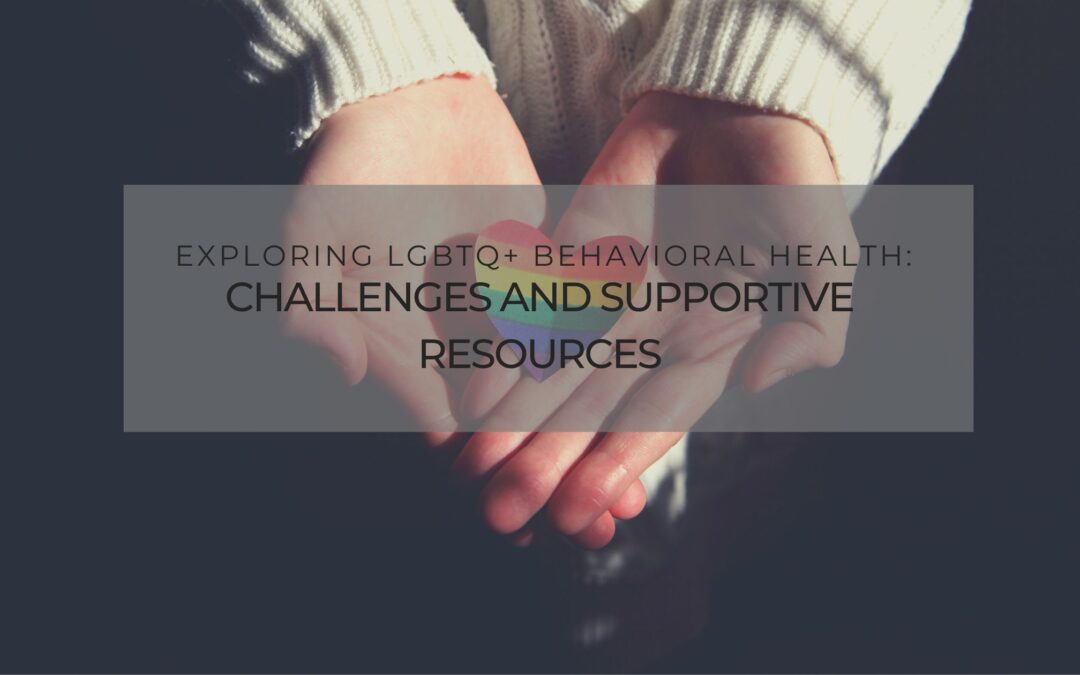The LGBTQ+ community has made significant strides in the fight for equal rights and acceptance over the years. However, challenges related to mental health and behavioral health persist for many LGBTQ+ individuals. Understanding these challenges and the available supportive resources is essential for promoting mental well-being and reducing the disparities that affect this community.
Challenges in LGBTQ+ Behavioral Health
- Stigma and Discrimination: LGBTQ+ individuals often face stigma, discrimination, and prejudice in various aspects of their lives. These negative experiences can have a detrimental impact on their mental health, leading to increased rates of depression, anxiety, and even suicidal ideation.
- Coming Out: The process of coming out can be emotionally challenging and stressful. Fear of rejection by family, friends, or coworkers can contribute to feelings of anxiety and depression. Many individuals grapple with self-acceptance and societal acceptance.
- Family and Social Support: The level of support from family and social networks can vary significantly for LGBTQ+ individuals. Those who lack support may experience a greater risk of mental health issues. Isolation and rejection can be particularly damaging.
- Bullying and Harassment: LGBTQ+ youth are more likely to experience bullying and harassment at school or online. This can result in feelings of fear, anxiety, and depression, with the potential for long-term emotional trauma.
- Minority Stress: Minority stress, also known as LGBTQ+ stress, refers to the chronic stress that can result from being part of a marginalized group. This stress can lead to a range of behavioral health challenges, including substance abuse and addiction.
- Healthcare Disparities: LGBTQ+ individuals often face healthcare disparities, which can affect their access to mental health services. It can be challenging to find healthcare providers who are knowledgeable about LGBTQ+ issues, leading to potential gaps in care.
Supportive Resources for LGBTQ+ Behavioral Health
- Mental Health Professionals: Finding a mental health professional who is LGBTQ+-affirming is essential. Look for therapists, counselors, or psychologists who have experience in LGBTQ+ issues and are inclusive in their approach to care.
- Crisis Hotlines: Many crisis hotlines, such as The Trevor Project, are available to support LGBTQ+ individuals in crisis. These hotlines offer a safe and understanding environment for those who need someone to talk to.
- Supportive Organizations: Numerous organizations are dedicated to supporting the mental health of LGBTQ+ individuals. The National Alliance on Mental Illness (NAMI), Mental Health America, and the GLBT National Help Center are valuable resources.
- Peer Support Groups: Joining peer support groups for LGBTQ+ individuals can provide a sense of belonging and community. Sharing experiences with others who understand your challenges can be therapeutic and empowering.
- Online Resources: The internet offers a wealth of information and resources for LGBTQ+ individuals seeking support. Many online forums, articles, and videos can provide guidance and reassurance.
- Educational Initiatives: Some organizations and educational institutions offer training and educational initiatives to raise awareness of LGBTQ+ mental health issues. These initiatives aim to combat stigma and improve cultural competence among healthcare providers.
- LGBTQ+-Friendly Healthcare Providers: Seek out healthcare providers known for their LGBTQ+ inclusivity. Many LGBTQ+ organizations maintain directories of LGBTQ+-friendly healthcare professionals, which can help you find the proper care.
- Legal Protections: Familiarize yourself with legal protections and anti-discrimination laws in your area. Knowing your rights can provide security and empower you to advocate for equal treatment.
Conclusion
Promoting the behavioral health of LGBTQ+ individuals is an ongoing effort that involves combating stigma, discrimination, and healthcare disparities. While challenges persist, it’s essential to acknowledge the resilience and strength of the LGBTQ+ community. Supportive resources and a growing understanding of the unique challenges they face can contribute to improved mental health outcomes. Remember, seeking help when needed is a sign of strength, and there are numerous supportive resources available to ensure the well-being of LGBTQ+ individuals.
